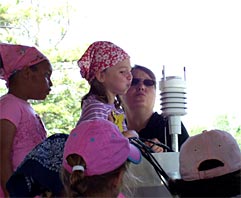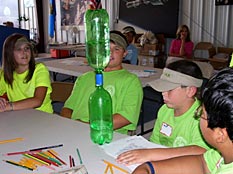
On June 6, education and outreach staff from the ARM Southern Great Plains (SGP) site spent four hours helping local Girl Scouts earn their Weather Badges. Nearly 100 scouts participated in the day camp held outdoors at Reeves Park in Norman, Oklahoma. Seven “learning stations” were staffed by female volunteers ranging from professional meteorologists to graduate and undergraduate students. Station topics included pressure and temperature, weather maps, fronts, tornadoes, lightning, heat, and seeing the instruments of a weather station. Troops rotated every 20 minutes through all seven stations.

Additional education and outreach staff from SGP presented half-day weather sessions at two Chickasaw Nation Aviation and Space Camps held on June 14 and 20. Students were given weather maps from April 24 to see how the weather changed throughout the day, eventually producing a small tornado near El Reno, OK. Campers watched video of the El Reno tornado as it tore through an abandoned airplane hanger at the El Reno airport. Students were supplied with Styrofoam meat trays, straws, popsicle sticks, tape, cardboard, and construction paper to build a wind-resistant structure. A multi-speed leaf blower was used to test the strength of each structure. A total of 75 students attended the space camps, which took place at the Ada Municipal Airport in Ada, Oklahoma.
Education and outreach activities sponsored by the ARM are geared toward K-12 students and teachers, as well as the communities that host ARM sites. More information on these activities can be found on the ARM education webpages.

